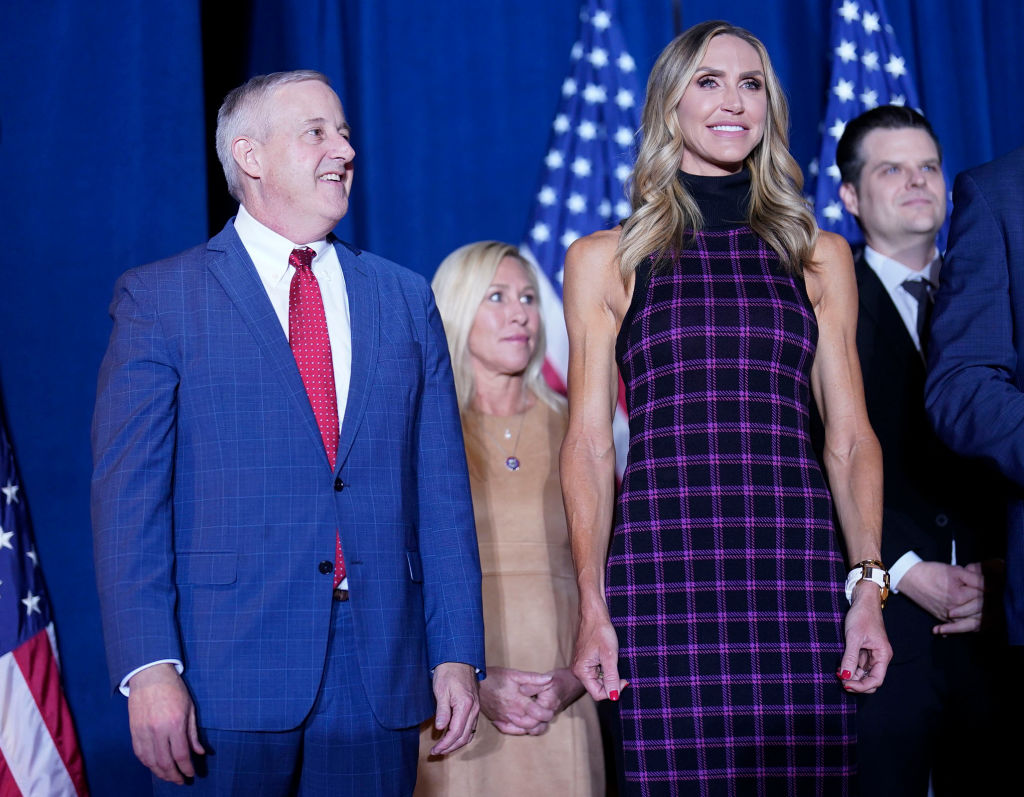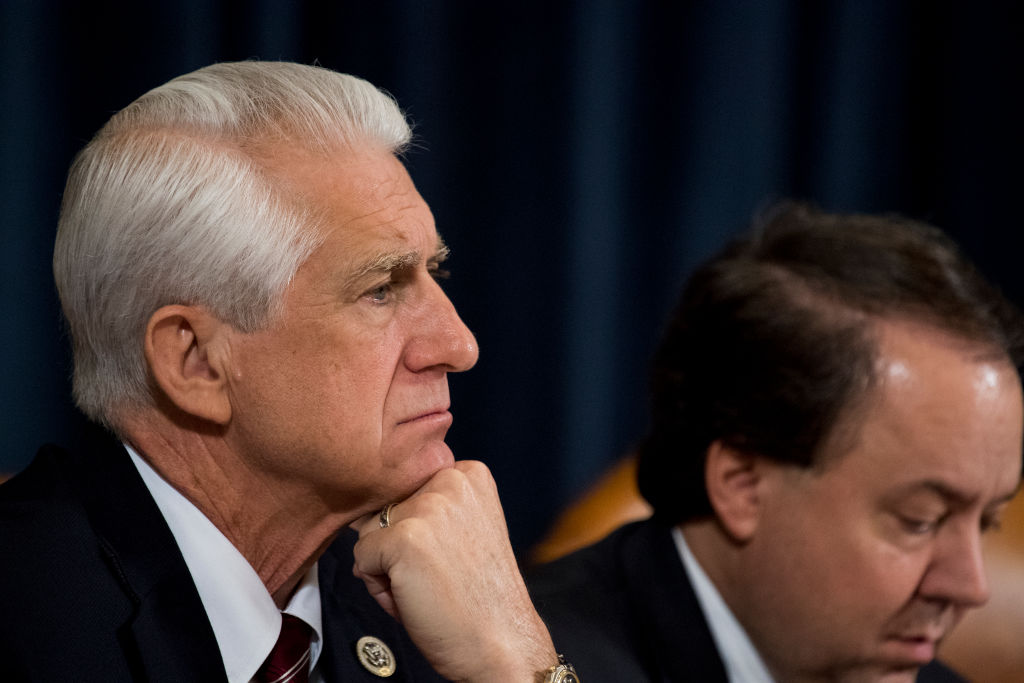Happy Friday! And we better not bury the lead on the biggest political story of the day: Babydog, the English bulldog owned by Gov. Jim Justice of West Virginia, has endorsed fellow Republican Moore Capito to succeed Justice in Charleston. No word if Babydog is supporting Justice’s bid for the U.S. Senate.
Up to Speed
- Senate Republican leaders are prepared to buck Donald Trump if the party’s presumptive nominee urges them to end the filibuster, Axios reported Thursday. Republican leaders such as Sens. John Thune, John Cornyn, John Barasso, and Steve Daines, have said they believe the filibuster should remain in place, either because of its institutional status in the Senate or for fear of what Democrats might do in the majority without it. During his presidency, Trump made unsuccessful overtures to Republican then-Majority Leader Mitch McConnell in an attempt to change the 60-vote threshold so that senators would have to actually speak to hold the floor to block a bill.
- Prince George’s County Executive Angela Alsobrooks released an ad Thursday that featured several prominent Democratic Maryland leaders endorsing her campaign for the state’s Senate seat, where she faces Rep. David Trone in their party’s primary. Gov. Wes Moore and Sen. Chris Van Hollen joined other members of the state’s congressional delegation in saying she was “the Democrat who will win.” Trone leads Alsobrooks in primary polling. Former Gov. Larry Hogan, the likely Republican nominee, leads them both in polling for the general election.
- House Speaker Mike Johnson appeared at Columbia University Wednesday as pro-Palestinian protests continued to tie up activities on the Manhattan campus. Johnson, flanked by multiple Republican members of Congress, called on President Joe Biden to send in the National Guard to quell the protests as members of the nearby encampment on Columbia’s West Lawn jeered at him. “My message to the students inside the encampment is go back to class and stop the nonsense,” said Johnson, who also called on Columbia’s president Minouche Shafik to resign.
- A Thursday economic report from the Department of Commerce indicates GDP grew at 1.6 percent in the first quarter of the year, less than half the growth of the previous quarter and 0.8 percent less than what economists had expected. Though President Joe Biden has recently tightened his polling margin with Trump, the report could be bad news for the president, as voters have consistently rated him poorly on the economy.
- As Trump’s hush-money trial in Manhattan heats up this week, Mike has what you need to know about it in the weekly Collision newsletter from yesterday, plus some developments in the former president’s classified documents case in Florida.
RNC-Trump Campaign Field Program Runs Aground

The Republican National Committee was poised to open and staff 40 satellite campaign offices across key battlegrounds when former President Donald Trump, now the presumptive GOP nominee, abruptly replaced RNC Chairwoman Ronna McDaniel and her deputies with fresh leadership.
Trump’s new RNC team, led by Chairman Michael Whatley, Co-Chair (and Trump’s daughter-in-law) Lara Trump, and senior campaign adviser Chris LaCivita, killed McDaniel’s 2024 blueprint. Roughly six weeks later, neither the committee nor the Trump campaign has much infrastructure or personnel in the swing states that will decide the November 5 election, multiple sources in Washington and the crucial battleground states told Dispatch Politics this week.
That means few if any regional and local campaign headquarters; little to no deployed field staff; and little to no traditional voter turnout activities, such as door-knocking, phone banking, or volunteer organizing. Even after the Trump-led RNC’s reimagined field program eventually emerges, their strategy is to concentrate almost exclusively on the half-dozen states that will determine Trump’s fate. Republicans elsewhere? They’re on their own.
“The RNC was aggressively staffing up in 10-plus states and it was put on hold when Trump started to make the changes at the RNC,” a veteran Republican field operative said. “The new regime is moving quickly to get the field operation going but I expect it to be narrowly focused on presidential battleground states, as opposed to expanding operations in states like California and New York, where there are a lot of House seats in play.”
In early March, the RNC’s new leadership sacked more than 60 full-time staff across the communications, data, and political departments. As Dispatch Politics reported soon after, roughly 40 of the 60 let go were field troops.
The majority of all fired employees were immediately invited to reapply for jobs. But weeks later, the field program is lagging, especially compared to the voter turnout operation stood up by President Joe Biden. The incumbent Democrat’s campaign has opened 30 headquarters alone in Michigan and has multiple such offices in Wisconsin, Pennsylvania, Nevada, Arizona, Georgia, North Carolina, New Hampshire, and Florida.
The decision to jettison McDaniel’s preparations for a robust ground game that was similar in scope and strategy to the RNC’s efforts to boost Trump in 2016 and 2020 appears to have originated at the top. Trump repeatedly told McDaniel in conversations before he pushed her out of the chairmanship that he did not need the RNC to focus on “get-out-the-vote” activities. Rather, knowledgeable Republican sources told us, the former president informed McDaniel he wanted the committee to prioritize “election integrity” efforts.
“He was very clear about that—for the last six months: ‘I’m not worried about turning out the vote, I just want to catch the cheaters.’ So in a lot of ways, this aligns with his vision,” one GOP insider said.
“Notice they didn’t fire any of the election integrity staff, that’s where they’ve ramped up,” this source added. Indeed, Trump selected Whatley to take over for McDaniel largely because he appears to share the former president’s view that Biden’s 2020 victory was illegitimate. Before Trump tapped Whatley for RNC chairman, he served as the committee’s general counsel chairman of the North Carolina GOP.
Dispatch Politics spoke to more than a dozen veteran GOP operatives, in Washington and key battleground states, most of whom are active this cycle trying to elect Republicans to federal office and are familiar with party efforts (or lack thereof) to win the White House and recapture majorities in the House of Representatives and the U.S. Senate. All demanded anonymity to speak candidly to protect their clients and avoid reprisals from the Trump campaign.
The RNC responded to this story by providing a prepared statement from Trump campaign spokesperson Danielle Alvarez. Interestingly enough, her comments suggest that the former president’s team acknowledges the 2020 election was not, in fact, stolen. Alvarez’s response read:
The RNC is building out its operations with resources concentrated in states with heavy overlap between Presidential, Senate, and House battlegrounds. We are taking advantage of all legal ability to collaborate with external groups because it allows us greater global resource efficiency. Gone are the days of bloated overhead and inflated voter contact numbers. We are committed to ruthlessly executing a highly tactical, highly targeted approach to winning in 2024. If the old system worked, President Trump would be finishing his second term alongside his House and Senate majorities.
Since the March overhaul, the RNC has filled a half-dozen top field positions, and Michigan now has a state director. Some of the Republican insiders we queried say the voter turnout operation is taking shape and predict it will prove effective. But the program might be run differently than it has since 2014. Some party operatives say the Trump campaign could farm out the door knocking, phone banking, and other get-out-the-vote activities to an outside group or vendor.
Confidence in LaCivita and Trump’s other senior adviser, Susie Wiles—because of their reputations for being skilled political tacticians and campaign enforcers—is a major reason for the optimism, at least for those who are optimistic. “Did they have to go about this in as dramatic a way as they did? Maybe not. But they had to put their system in place,” a Republican strategist said. “I don’t think what’s going on is that abnormal.”
Not all that surprisingly, some Republicans remain quite anxious.
We checked in with Republican operatives in Arizona, Georgia, Michigan, Nevada, Pennsylvania, and Wisconsin. They see little evidence, if any, that typical get-out-the-vote activities—including voter registration and volunteer recruitment and training—are happening. Nor have they seen any signs that there is staff on the ground to conduct such activities. They say they do not expect the RNC to address the problem anytime soon.
“Trump can win Wisconsin again, but the infrastructure needs to be on par with the Democrats for him to have a chance,” a GOP consultant in the Badger State said. “Wisconsin Republicans have lots of work to do and not much time to waste.”
This concern is especially acute for Republican strategists working down-ticket races that could determine control of a closely divided Congress—not just in so-called orphan states like California and New York, but in targeted presidential battlegrounds like Pennsylvania. “Internally, for all of my races, we’re assuming party infrastructure broadly will be of no help,” a GOP operative in Pennsylvania said.
In Washington State, Bird Snags GOP Endorsement Over Reichert

Dave Reichert looks like the ideal Republican candidate for governor in deep-blue Washington state. He’s a former congressman and sheriff from the Seattle area. He’s handily out-fundraised other Republicans running. Reichert is not only widely perceived as the likeliest Republican to face off against leading Democrat Bob Ferguson, but he’s giving the GOP its best shot to win the governor’s race in Washington in 20 years.
So why did the state party endorse a former local school board member with hardly any electoral experience and very little money?
That’s the question vexing multiple Republican operatives and donors in the Evergreen State after the Washington GOP voted at its convention in Spokane to endorse Semi Bird, a Republican activist from the Yakima Valley in the eastern part of the state. Shortly before the vote on April 19, Reichert himself disavowed the endorsement process and withdrew his name for consideration.
“The party has been taken over by a small group of ideologues and a radical group,” Reichert told Dispatch Politics this week. “If you’re not a part of this ideology, you’re their enemy, is sort of what I pick up.”
The kerfuffle is just the latest example of divisions within state Republican parties that risk hampering the GOP’s electoral prospects. Just this year, the Michigan GOP ousted its own chair, Kristina Karamo, for her misuse of party funds but also amid widespread discontent within the state’s establishment with her management of the party. And in January, Arizona’s Republican chairman Jeff DeWit resigned after embarrassing audio of him offering Kari Lake money and a job to drop her bid for the U.S. Senate leaked—seemingly coming from Lake herself.
The disarray within the Washington GOP was evident on the floor of the convention. After Bird admitted earlier this month to the Seattle Times that he had a misdemeanor conviction for using his father’s name and Social Security number on a credit application 30 years ago, the party’s candidate committee disqualified him on April 19, saying he was not forthcoming about his past. The party tabled its endorsement for governor, but the convention’s delegates—a majority of whom were Bird supporters—overturned the disqualification and eventually voted to endorse Bird.
The endorsement did not make Bird the party’s nominee. In Washington’s nonpartisan “blanket primary” system, every candidate eligible for the ballot runs in a single primary election—this year, on August 6. The top two vote-getters, regardless of party, proceed to the general election. Ferguson, the state’s attorney general, is the frontrunner in both the primary and the general election to succeed retiring Democrat, Gov. Jay Inslee.
Reichert remains the leading Republican candidate and is favored to make it through the primary. His base of support is in the suburbs of Seattle, the state’s largest population center. And between his 14 years in the House and his reputation in law enforcement—he was one of the leaders on the task force to investigate and find the Green River Killer—he has the credentials and name recognition for a statewide campaign even without the party’s endorsement.
But the Washington GOP has thrown a lifeline for Bird. The endorsement could help him get more attention and money, both of which his campaign desperately needs.
“His campaign is a mess,” Christopher Gergen, a Republican consultant who ran the gubernatorial campaign for 2020 Republican candidate Loren Culp, told Dispatch Politics.
He said Bird, first and foremost, lacks the fundraising and statewide campaign infrastructure to win the general election. Bird ranks fourth in fundraising among candidates who are still in the race—the $440,000 he has brought in pales in comparison to Reichert’s $2.5 million and Ferguson’s $6.5 million. But Gergen added that Bird’s more conservative messaging also presents a handicap.
“His messaging isn’t consistent with the voters in Washington State that he needs to win, which is your moderates and your independents,” he said. “His messaging isn’t in keeping with winning those voters.”
Bird isn’t a professed MAGA candidate, but he does seem to draw support from the wing of the party most aligned with Trump. He was recalled from his position on the school board in Richland in 2023 about a year after he voted, against the state’s orders, to make his district mask-optional. Now, he is promising, as one pillar of his campaign platform, to support a “parents bill of rights” that would give parents “full access to ALL curriculum and supplementary materials used in their child’s classroom.”
“I have the Republican Party base to win the primary election to get me to the general election,” Bird confidently told Dispatch Politics. He added that the significant outreach to minority communities he has done (Bird is black) would also be a driving force in his winning the general election.
Some of Bird’s supporters expressed dissatisfaction with Reichert’s more centrist positions. M.J. Bolt, the chair of the Spokane County GOP, attributed the party’s struggles in Washington state—Republicans have not won the state’s governorship since 1980—to the moderate candidates the party has put forward.
“To do the same thing and expect different results is the definition of insanity, and we’ve got to do something drastically different,” Bolt told Dispatch Politics. “There’s been a push for these more moderate candidates from the Republican Party for years, and it hasn’t worked.”
She added that Reichert’s CPAC score, cap-and-trade vote in Congress, and COVID-19 comments were major reasons why her county party endorsed Bird, saying he was “more inspiring” and a better speaker than Culp, the 2020 Republican candidate.
Washington State Republican Party Chairman Jim Walsh told Dispatch Politics that the difference between Bird and Reichert is not so much one of political philosophy but of temperament—Bird being “more charismatic and kind of flamboyant” and Reichert being “very laid back and sort of low key.” He described each as “constitutional conservative” but said Washington Republicans should vote for Bird in the primary because he better represents the discontent with the Democratic domination of the state.
“He’s an authentic voice for a lot of the frustration and even anger in Washington,” Walsh said.
But Reichert has also leaned on his more moderate reputation as an asset in the August blanket primary. “You can’t win from a far-right position in the state of Washington,” he told Dispatch Politics. “I just think that people are looking for a calming voice in the storm.”
Notable and Quotable
“Wow! Former A.G. Bill Barr, who let a lot of great people down by not investigating Voter Fraud in our Country, has just Endorsed me for President despite the fact that I called him ‘Weak, Slow Moving, Lethargic, Gutless, and Lazy’ (New York Post!). Based on the fact that I greatly appreciate his wholehearted Endorsement, I am removing the word ‘Lethargic’ from my statement. Thank you Bill. MAGA2024!”
—Former President Donald Trump in a Truth Social post, April 24, 2024







Please note that we at The Dispatch hold ourselves, our work, and our commenters to a higher standard than other places on the internet. We welcome comments that foster genuine debate or discussion—including comments critical of us or our work—but responses that include ad hominem attacks on fellow Dispatch members or are intended to stoke fear and anger may be moderated.
With your membership, you only have the ability to comment on The Morning Dispatch articles. Consider upgrading to join the conversation everywhere.